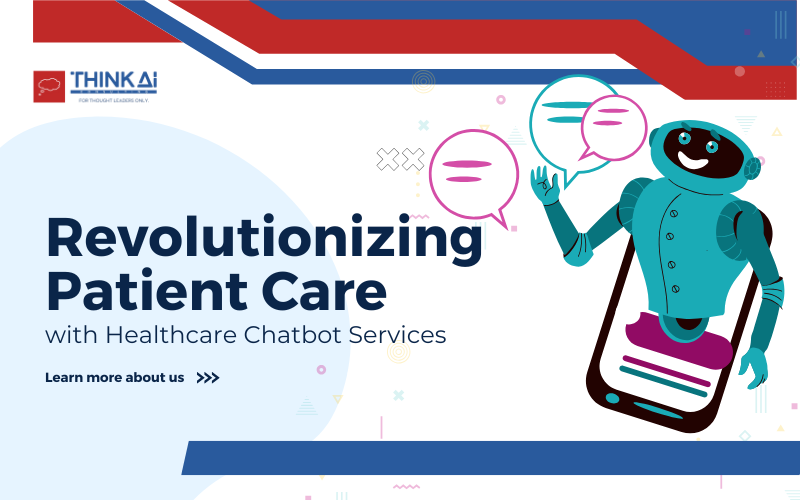The healthcare industry has always been the first to bring new advancements. As the world is progressing, so are diseases and multiple complications. Healthcare needs to constantly evolve to improve patient care and access to medical services at the same pace. Healthcare chatbots represent the most recent technical breakthrough. These tools have changed the way patients and doctors interact. The idea is to make these chatbots more effective, tailored, and accessible than ever before.
We explore here how healthcare chatbots are changing the face of patient care and why they are becoming important in the healthcare world.
What is Healthcare Chatbot?
Imagine having a health query at 3 a.m. and getting immediate answers without stepping out or waiting until morning. This is the wonder of healthcare chatbots. Healthcare chatbots are AI-powered digital assistants that replicate human conversations and offer real-time assistance. They may answer questions about health, schedule appointments, give prescription reminders, and even help with symptom triage. They act as a liaison between patients and clinicians, available at all hours of the day and night.
Advantages of Healthcare Chatbots for Patients
24/7 accessibility.
Healthcare chatbots provide instant assistance at any time and from any location. This fast assistance comes in useful for late-night health worries or forgotten appointment details.
Faster Responses
Chatbots provide real-time responses. So, it’s like talking to another human at your convenience. They don’t have to sign up or as opposed to traditional techniques, which may require patients to wait days for a doctor’s appointment or a callback. This can save lives in emergency situations by delivering quick replies.
Personalized Health Support
Modern chatbots can study a patient’s history and preferences and use that to provide relevant advice. They might give diet suggestions to a diabetic or exercise tips for patients with cardiac problems. So, healthcare feels more personalized to the patient.
Ease in Anxiety
Health care matters are usually accompanied by anxiety, especially when people await professional advice. Chatbots first serve as a point of contact, providing reassurance and assistance to alleviate a patient’s concerns.
Why Do Providers Love Using Chatbots?
Healthcare providers also profit from chatbots. These tools help to streamline processes, minimize workload, and improve patient outcomes in the following ways.
Automating administrative tasks
Chatbots do everyday duties such as appointment scheduling, reminders, and answering frequent questions. This enables healthcare workers to focus on more complex patient requirements.
Improving Patient Engagement
It’s quite easy to forget a pill or skip a planned shot. These things occur to the best of us. However, having a personal chatbot friend to keep you engaged in the treatment process via regular messages might be really beneficial.
They can give follow up reminders, and wellness tips. This will make the patients stick to the prescribed treatment and follow-ups.
Triage System
Chatbots can evaluate a patient’s symptoms and advise on whether the treatment could be done at home or through telemedicine or a visit to the emergency room. Chronic Disease Management Chatbots provide lifestyle suggestions, track health metrics, and remind patients about checkups for illnesses such as diabetes and hypertension.
The role of AI in revolutionizing healthcare
Think AI is driving innovation in healthcare chatbots. It uses powerful AI technologies to give customizable chatbot solutions that are both functional and intuitive. It delivers a human-like, conversational experience that triggers trust and participation.
Think AI’s healthcare chatbot services set a new bar in terms of patient engagement and data-driven decision-making across industries.
The Future of Healthcare with Chatbots
As healthcare embraces digital transformation, chatbots are increasingly important.
Medication Reminders: Chatbots send reminders to ensure patients take their medications on time, thus improving treatment adherence.
Mental Health Support: Chatbots can provide instant emotional support and connect users to professional help when needed.
Post-Treatment Follow-Ups: They ensure patients adhere to post-surgery care plans, reducing complications and readmissions.
Chronic Disease Management: Chatbots provide lifestyle suggestions, track health metrics, and remind patients about checkups for illnesses such as diabetes and hypertension.
They’re not just tools—they’re partners in health because they empower providers to deliver their best.
The future of Healthcare Chatbot Services is bright. They will evolve to include much more advanced capabilities, such as integrating with wearable devices, providing predictive health insights, and even detecting early signs of medical conditions through AI-driven analysis.
Leap towards Smarter Healthcare
As healthcare adopts a more patient-centric method, the chatbots that lead the charge ensure anyone has access to reliable efficient and personalized care-anytime-anywhere.
Are you prepared to welcome the future of healthcare? Let Think AI chatbots guide the way toward smarter, more connected care.

